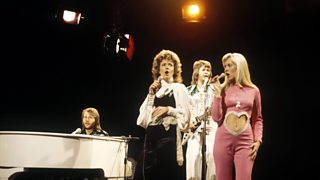Musicians: What have they got to complain about?
13 October 2014
As Iggy Pop delivers the annual John Peel Lecture on the subject of 'free music in a capitalist society', BBC News Technology Reporter JOE MILLER checks musicians' royalty statements.
Who'd be a musician in the internet age?
First, piracy threatened to corrode their livelihoods, then pay-to-download services like iTunes permanently reduced the price one could expect to fetch for an album, and now online streaming services, from YouTube and Spotify to Vevo and Beats Music, have demolished the traditional revenue models of performing artists.

Spotify: the last fart of a dying corpseThom Yorke
Understandably, many old timers have refused to go down without a fight. Radiohead frontman Thom Yorke famously called Spotify "the last desperate fart of a dying corpse", the near-deceased being the record industry.
Patrick Carney of the Black Keys initially kept the band's music off similar services because he felt it was not feasible for the duo to make a living from the meagre royalties.
At first glance, it's easy to see where they, and many others, are coming from. The Swedish streaming site pays an average of between $0.006 and $0.0084 per stream - out of which record companies take their share too, leaving anyone other than the most successful of artists with an even punier sum.
iTunes, once seen as the saviour of digital music, keeps roughly a third of the revenues it receives for its 59, 79 and 99p priced tracks, but its business model is slowly being eroded by Spotify, Rdio and Pandora, among others.

It is no coincidence that those who most vocally bemoan this transition tend to be veteran performers, who shot to fame at a time when a popular artist could expect to sell millions of albums through high-street shops around the globe, and when a hefty back catalogue was as good a pension plan as any. Those days are well and truly gone.
Modern upstarts, such as alt-J and Calvin Harris, who recently breached one billion streams on Spotify and reportedly netted £4m in royalties, have unsurprisingly embraced streaming services.
Even those who do not enjoy the stature of Mr Harris or Scandinavian dance music superstar Avicii, and who cannot expect a similar pay cheque, have resigned themselves to the fact that they will earn their keep primarily by touring or doing promotional work.

Ed Sheeran, who said he once received a single figure cheque from Spotify, recently proclaimed that to him, online music was essentially a promotional vehicle for live performances.
In some ways - not that this will be of any consolation to the likes of Thom Yorke and David Byrne - it was ever thus. The professional "recording artist" as we know it is a relatively modern phenomenon. Before the Gramophone came into being at the turn of the last century, and disc records became easily-accessible and affordable, artists made money by either performing live, selling their compositions, or teaching music.
Even the most talented had to find alternative revenue streams in order to make ends meet - Gustav Mahler worked as a conductor, writing his early compositions during his spare time.
Furthermore, as industry analyst Mark Mulligan points out, the top 1% of artists have long accounted for some 80% of revenues in the record business - meaning those who could support themselves with album sales alone were always in the minority.

All it takes for Universal to get their clients' output onto digital music services is the submission of a file and an image of the cover art
Yet it is probably the old methods of doing business that are hurting artists more than technological innovation. As Billy Bragg has opined, it once made sense for record companies to retain some 50% of revenues - after all, they had to pay to produce, distribute and promote their fledgling talent's works, which was a laborious, expensive and risky exercise.
All it takes for Universal et al to get their clients' output onto digital music services is the submission of a zip file along with a JPEG image of the cover art.
Overall, revenues have not even declined that steeply - the industry dropped just 3% between 2000 and 2013, according to MiDiA research. It's the distribution of the takings that has shifted significantly.
Which begs the question, when will musicians leave record labels behind? Thom Yorke's latest experiment, releasing his album via peer-to-peer file sharing network BitTorrent, garnered one million downloads in a week.
Apple's much maligned promotion of U2's Songs of Innocence album - which pushed the work onto 500 million iTunes customers’ accounts, has reportedly been downloaded by 26 million people to date, making it one of the most popular albums of all time.
Technology has also been kinder to unsigned, or "emerging" artists.
Using an aggregator, they can get their music on Spotify or other streaming services for a modest fee, or on SoundCloud for no charge, and if lucky enough to be showcased, or if able to generate a buzz on social media, they can be catapulted to stardom before agreeing a record deal.

Yes, the success stories are few and far between, but how many failed where The Rolling Stones, Abba or Eminem succeeded?
The future of the recording artist is uncertain, but prophecies of the musician's demise may yet prove premature.
Iggy Pop delivers the John Peel Lecture live on 6Music, 13 October 2014, on Free Music in a Capitalist Society. The lecture is also being filmed for broadcast on BBC Four, on 19 October.

-
![]()
I Gotta Right: Pop idol
Is Iggy Pop the ultimate performer? Chrissie Hynde on the influence of the Stooges front man, plus enjoy out -there classic performances.
-
![]()
Iggy Pop: John Peel Lecture
Iggy Pop delivers the BBC Music John Peel Lecture 2014 on the topic of Free Music in a Capitalist Society.


